Tags
Arguably Essays, Biblophilia, Capitalism, Christopher Hitchens, Essay, Fourteen Stories None of Them are yours, Harry Potter, How to Make Love like a Porn Star: A Cautionary Tale, King James Bible, Letter to a Christian Nation, Mein Kampf, On the Origin of Species, Prisoner of Shelves, The Book of Beetles, The Book of Common Prayer, The Catcher in the Rye, The Demon Haunted World: Science as a Candlelight in the Dark, The Descent of Man, The Male Nude, The NSA is NOT holding the Author of this essay, The World According to Garp, Ulysses
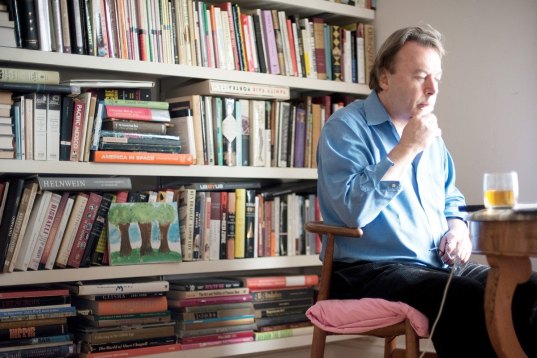
The other day I was in line at Hastings with a pile of books that required two hands and my brother-in-law was making fun of me for it. You see he’s the kind of man that enjoys cars, video games, NetFlix, clothes, and while I enjoy these objects and activities as well, he lives in them the way I live in books and so when I told my wife I would find shelf space for each of the books he replied, “You mean floor space.” It was hard to argue with the man because he was right. In my office there are now two 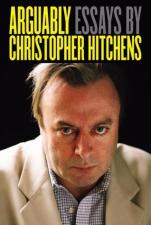 stacks of books resting against two out of the four shelves in my office. The reason for this position is due more to the fact that they are oddly shaped, being too vertical or being too thick for placement beside the more slim volumes in my library. But this situation
stacks of books resting against two out of the four shelves in my office. The reason for this position is due more to the fact that they are oddly shaped, being too vertical or being too thick for placement beside the more slim volumes in my library. But this situation 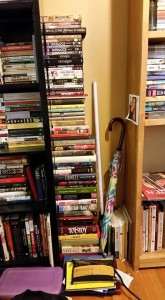 reminded me of the closing essay in Christopher Hitchens’s Arguably Essays collection entitled Prisoner of Shelves.
reminded me of the closing essay in Christopher Hitchens’s Arguably Essays collection entitled Prisoner of Shelves.
In many ways the essay about a love of reading and the collection of books borders on cliché, because almost every writer must at some point write it, and this is not limited to men like Hitchens or Emerson, men who made it the dedication of their careers to contribute to the ever rising mountains of knowledge. Every other blogger I have observed online dedicated to creative writing or classic literature at some point comments on the ever rising stacks in their apartments or homes, and my own family attests to this pattern of behavior since our regular family outing involves a bi-annual/bi-monthly/bi-weekly pilgrimage to the Half Priced Books Store in Dallas where we come home, on a calm day, with at least two boxes of books.
I cannot properly explain why I purchase books and collect them in the gradually shrinking space of my office, nor can I explain why, whenever I go shopping with my wife, 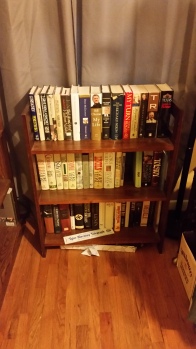 I must have a book on hand even if there’s never an opportunity afforded to me to actually read it. I compulsively buy books, but never simply for the sake of owning them, though that motivation is certainly there.
I must have a book on hand even if there’s never an opportunity afforded to me to actually read it. I compulsively buy books, but never simply for the sake of owning them, though that motivation is certainly there.
But allow me to return to Hitchens, who was the original inspiration for this essay. He begins his essay with a literary anecdote which is common to the man’s style and one of the reasons I envy him terribly. Hitchens never devolved his argument into sentiment, and his anecdotes were usually so obscure or so biting that you didn’t find yourself growing complacent. He says:
In Bruce Chatwin’s novel Utz, the eponymous character becomes the captive of his porcelain collection—and eventually loses his life because he cannot move without it. From this book, I learned that a word actually exists—Porzellankrankheit—for the mania for porcelain acquisition. I also learned that the root of the word is the same as that for “pig,” because poured trays of molten porcelain looked so pink and fat and shiny.
I’m pretty sure of my facts here. And if I could only put my hands on the book, I could 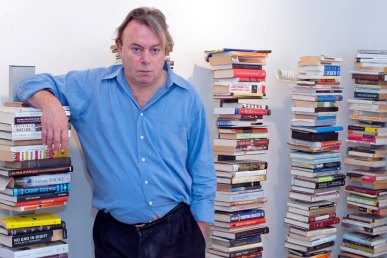 be absolutely sure. But is it shelved under U for Utz, or perhaps under C for Chatwin? Or is it in that unsorted pile on top of the radiator? Or the heap of volumes that migrated from the living room to the dining room? I am certain that I didn’t lend it to anyone: I am utterly miserly about letting any of my books out of my sight. Yet my books don’t seem to reciprocate by remaining within view, let alone within easy reach. (748).
be absolutely sure. But is it shelved under U for Utz, or perhaps under C for Chatwin? Or is it in that unsorted pile on top of the radiator? Or the heap of volumes that migrated from the living room to the dining room? I am certain that I didn’t lend it to anyone: I am utterly miserly about letting any of my books out of my sight. Yet my books don’t seem to reciprocate by remaining within view, let alone within easy reach. (748).
Before I married I imagined my own dwelling place would be similar to this description. I was originally planning on finding an abandoned church, removing the cross from the top, and filling it to the brim with books. I’m not sure why I chose a church. The church I imagined was always the Episcopal church I grew up in, and was always bored in. To this 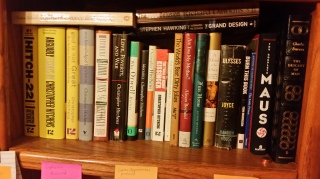 day I still wonder why on earth would I choose that spot, but then again looking back upon it makes sense. That room, really a hall, was always so massive, at least I thought it was when I was a kid, it’s been ages since I set foot in it, so just imagine how many books could actually be placed in it. I picture stacks upon stacks of books filling the pews and walls and the pillars that would support the top.
day I still wonder why on earth would I choose that spot, but then again looking back upon it makes sense. That room, really a hall, was always so massive, at least I thought it was when I was a kid, it’s been ages since I set foot in it, so just imagine how many books could actually be placed in it. I picture stacks upon stacks of books filling the pews and walls and the pillars that would support the top.
In my own house I cannot leave books everywhere due to the fact that my dog Huckleberry tends either to eat them or else lick them. And due to my wife’s lacking organizational skills, I have to keep track of my books less they disappear under piles of crafting supplies.
You would think my ever shrinking space would hinder my desire to purchase more. Hitchens himself noted this pain as he says: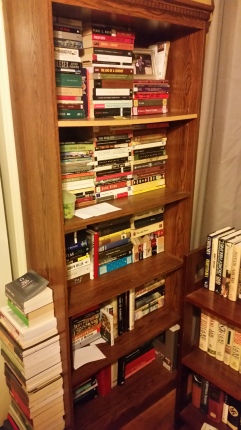
I live in a fairly spacious apartment in Washington, D.C. True, the apartment is also my office (though that’s no excuse for piling books on the stove). But for some reason, the available shelf space, which is considerable, continues to be outrun by the appearance of new books. It used to be such a pleasure to get one of those padded envelopes in the mail, containing a brand-new book with the publisher’s compliments. Now, as I collect my daily heap of these packages from my building’s concierge, I receive a pitying look. (748).
I know that look since most of my books go to my parents house where I pick them up. Recently I bough the Library of America Edition of Thomas Jefferson, which includes the man’s letters, speeches, autobiography, and personal documents. This of course came after my purchasing of Human Territoriality: It’s theory and history, which I need for my thesis, and this had also come after a massive splurge of purchases which included The Book of Beetles, Mein Kampf(just for reference NSA, FBI, and CIA, just for reference), The Demon Haunted World: Science As a Candle in the Dark, Letter to a Christian Nation, and The Male Nude. These books came in those “padded envelopes” and, I will admit, it was a thrill holding them and realizing that a new book, a new experience awaited me when I opened them. I didn’t think about the fact that I already have a pile of seven books I’ve already begun and can’t find shelf space for. Nor did I really care. In fact I wondered if I should go ahead and purchase Hitchens’s biography of Thomas Jefferson, and I did.
Don’t hate. Seriously, this is all for a good cause.
One of my defenses, to my own mind in the very least, is that my children will be readers and will find this bounty of knowledge useful as they pursue their own education. Though a gnawing fear has grown in the back of my mind recently. What if they spill juice on it. Kids make mistakes like that all the time. Half of the books I borrowed from my parents at a young age are covered with stains and even pen marks where I have apparently drawn in the books. What could I imagine myself doing as I discover my child drawing a poorly representation of an elephant in my first edition The Shining? What if they spill cranberry juice on my hardback Ulysses? I have the entire Harry Potter series in hardback, and of course I will read my children Harry Potter. I’m not Hitler after all (seriously NSA I only 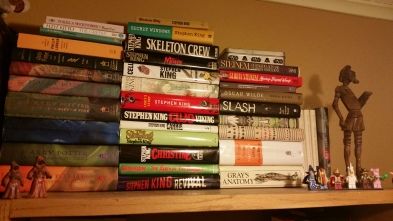 bought the book for references, I study history books too) and I would not want to prohibit joy and human growth by denying them Harry Potter. But they’re all first edition hardbacks, one of which is a special edition cover. They’ll want to take the books to school and read them, and of course friends will want to read them too. I may have to disown my children when fights ensue and my book is damaged. Perhaps it just better not to have children, that way my books will be safe.
bought the book for references, I study history books too) and I would not want to prohibit joy and human growth by denying them Harry Potter. But they’re all first edition hardbacks, one of which is a special edition cover. They’ll want to take the books to school and read them, and of course friends will want to read them too. I may have to disown my children when fights ensue and my book is damaged. Perhaps it just better not to have children, that way my books will be safe.
Bibliomania cripples my social life. In order to have a dinner party, I must clear all the so-far-unsorted books off the dining-room table. Either that, or invite half the
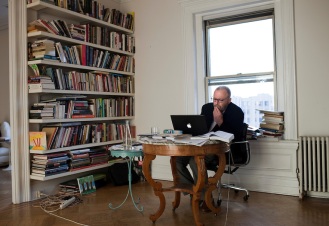
originally planned number of people and just push the books temporarily down to one end of it. In the spring, my wife and I host the Vanity Fair party that follows the White House correspondents’ dinner, and this means that I can get professional help with rearranging the furniture and the books. This past year, the magazine’s omnicompetent social organizer, Sara Marks, gave me some ingenious vertical shelf units, allowing me to stack books on their sides. Alas, there wasn’t time before the festivities to sort these useful display units by author or subject, so I’ve only been able to alter the shape of my problem, not solve it. (749).
Mr. Hitchen’s brings up another good point, there was a point years ago when I was able to place books on my shelves vertically, but as the photos I’ve provided of my own shelves attest, this was no longer a feasible option once I continued my education and read new books which in turn pointed me in the direction of other books I needed to read and own 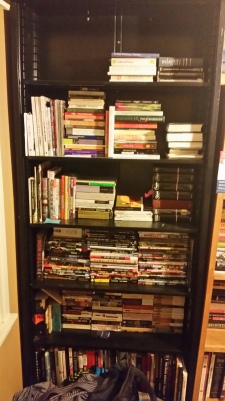 once I determined their merit. Books do possess a lovely aesthetic when stacked vertically, but I have found that this horizontal approach much more satisfying. Not only is it easier to read the titles (you don’t have that annoying bit of cocking your head to one side while trying to figure out which one you want to read) but you can also stack more books into one shelf space than if you stacked them vertically. But therein lies a problem of organization, for if you stack them so it becomes not about color, author, genre, etc., but instead the thickness and length of the book. My copy of On the Origin of Species is a squat little paperback tome while The Descent of Man is an elongated hardback. While both represent the work of Charles Darwin, stacking one on top of the other just create chaos which is a distraction from reading and writing.
once I determined their merit. Books do possess a lovely aesthetic when stacked vertically, but I have found that this horizontal approach much more satisfying. Not only is it easier to read the titles (you don’t have that annoying bit of cocking your head to one side while trying to figure out which one you want to read) but you can also stack more books into one shelf space than if you stacked them vertically. But therein lies a problem of organization, for if you stack them so it becomes not about color, author, genre, etc., but instead the thickness and length of the book. My copy of On the Origin of Species is a squat little paperback tome while The Descent of Man is an elongated hardback. While both represent the work of Charles Darwin, stacking one on top of the other just create chaos which is a distraction from reading and writing.
And dammit nothing should distract me from this activity.
Unless of course we discuss the nasty process of sorting…
The units also make it easier to read the titles on the spines and thus to suffer reproach for their randomness. And let’s say I did decide to organize these books: Should I start with A for Kingsley Amis? But wait, here’s a nonfiction work by Amis, on language. Shouldn’t it go on the reference shelf with the lexicons and dictionaries? And what about the new biography, and the correspondence between Kingsley and Philip Larkin?(749).
There was a time when I had an organizational structure for the books. There were even days dedicated to the cleaning and sorting of books. I would remove every book from my shelf, place them in piles, and wipe clean the shelves that were gathering dust. What would follow was usually an eight hour marathon of looking at books, determining their 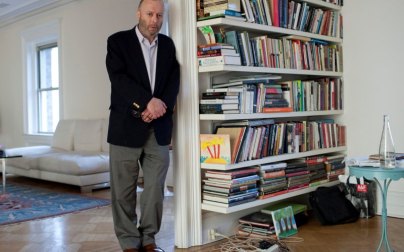 category, and placing them in the right context. Back in my parents house is a wall length book shelf that actually reach the ceiling and, to this day, remains sparse despite the number of books I left behind when I moved into this new house. I miss that shelf everyday for it’s order. There was a history section, a human sexuality section, there was the obligatory Stephen King section and below that was where rested the works of my dear Mr. Hitchens. The only reason he came after King was because Stephen King came first in my life. A teacher gave me a copy of the Green Mile, which I still possess, and that book made me want to become a writer. Christopher Hitchens just came along later and made me want to become a better writer, no offense Mr. King. This “Re-shelving day” was as beautiful as it sounds, because I allowed myself the chance to reassess books that had been sitting in my collection for some time. I would only ever part with three or four, and even then parting with those books came at a great personal cost.
category, and placing them in the right context. Back in my parents house is a wall length book shelf that actually reach the ceiling and, to this day, remains sparse despite the number of books I left behind when I moved into this new house. I miss that shelf everyday for it’s order. There was a history section, a human sexuality section, there was the obligatory Stephen King section and below that was where rested the works of my dear Mr. Hitchens. The only reason he came after King was because Stephen King came first in my life. A teacher gave me a copy of the Green Mile, which I still possess, and that book made me want to become a writer. Christopher Hitchens just came along later and made me want to become a better writer, no offense Mr. King. This “Re-shelving day” was as beautiful as it sounds, because I allowed myself the chance to reassess books that had been sitting in my collection for some time. I would only ever part with three or four, and even then parting with those books came at a great personal cost.
It may seem ridiculous, but that’s the true nature of Biblophilia. Each book, even if it is 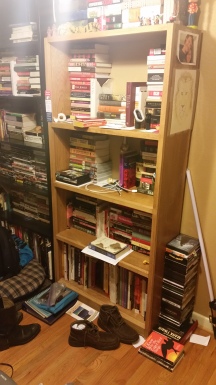 read but once, is a mark of your time and your own development. I would not be the person I am today had I not read The World According to Garp. While detested reading it Freedom remains one of the most important books in my collection. How to Make Love like a Porn Star: A Cautionary Tale is one of those books I know I will have to review someday. My hardback copy of Tolstoy, purchased a thrift store, remains one of the most beautiful books I shall ever read. Hitch-22, the book that got me started on the path to Hitchens, atheism, and unashamed intellectual passion will never leave my shelf. My paperback copy of Fourteen Stories None of Them Are Yours is signed by Luke Goebel and has an inscription that covers an entire page; one of the lines in it reads: “He is all heart & Return of American Bravery.” My copy of the King James Bible, and even The Book of Common Prayer, given to me on the day I was confirmed in the Episcopal church by the bishop. Can’t get rid of them, too much sentimental value. One of the most important books in my collection is my paperback copy of The Catcher in the Rye. I’ve read that book six times, three more times than was really necessary(three times for school NSA, the other three because I was an angry young man, get off my back). I hate Holden Caulfield but I don’t dare throw him out, because I was that young man once. You don’t throw away what you were. Unless you were a skinhead or someone who clubs baby seals for fun, then it’s okay.
read but once, is a mark of your time and your own development. I would not be the person I am today had I not read The World According to Garp. While detested reading it Freedom remains one of the most important books in my collection. How to Make Love like a Porn Star: A Cautionary Tale is one of those books I know I will have to review someday. My hardback copy of Tolstoy, purchased a thrift store, remains one of the most beautiful books I shall ever read. Hitch-22, the book that got me started on the path to Hitchens, atheism, and unashamed intellectual passion will never leave my shelf. My paperback copy of Fourteen Stories None of Them Are Yours is signed by Luke Goebel and has an inscription that covers an entire page; one of the lines in it reads: “He is all heart & Return of American Bravery.” My copy of the King James Bible, and even The Book of Common Prayer, given to me on the day I was confirmed in the Episcopal church by the bishop. Can’t get rid of them, too much sentimental value. One of the most important books in my collection is my paperback copy of The Catcher in the Rye. I’ve read that book six times, three more times than was really necessary(three times for school NSA, the other three because I was an angry young man, get off my back). I hate Holden Caulfield but I don’t dare throw him out, because I was that young man once. You don’t throw away what you were. Unless you were a skinhead or someone who clubs baby seals for fun, then it’s okay.
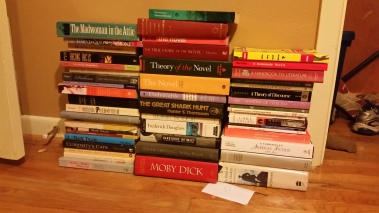 Where does this leave me, the reader? the writer? About the same place as Hitchens:
Where does this leave me, the reader? the writer? About the same place as Hitchens:
Some kind friends argue for a cull, to create more space and to provide an incentive to organize. All right, but I can’t throw out a book that has been with me for any length of time and thus acquired sentimental value, or that has been written by a friend, or that has been signed or inscribed by its author. I also can’t part with one that might conceivably come in handy as a work of reference, however obscure. All of which provokes newfound sympathy for poor Kaspar Utz. (749).
Biblophilia may at times come across as cheesy sentiment peddled in Reader’s digest, especially in this age of Kindles where solid texts seem to be becoming outmoded or useless. But let me pause on an essay that reminds me of my experiences with books. There is no doubt that media is changing, and the fact that you’re reading this on a cell phone or a tablet or a computer screen attests to this, but there is something to be said about the paper bound book. If nothing else, it is a physical reminder that you attempted to grow your mind. I think that’s it. You’re never the same person you were before when you finish a book. When you place it down, and come back to it later, perhaps you’re trying to find out who you were before. But you never will.
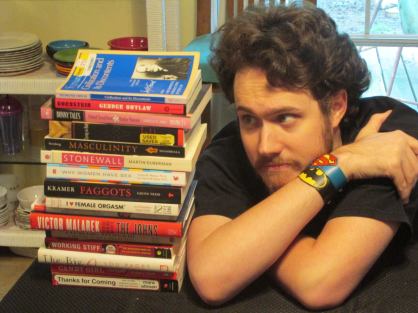
*Writer’s Note**
I’ve pretty much cited the entire essay by Hitchens, it’s only two pages long. I didn’t cite one part of the essay because by the time I finished I’d discovered the miss. If you’re interested in reading the entire essay I’ve posted a link to it here, or, if you’re taken by the spirit of Biblophilia, you can find it in Christopher Hitchens’s book Arguably Essays.
https://www.city-journal.org/article/prisoner-of-shelves
**Writer’s Note**
The NSA is not currently holding the author of this blog under suspicion of possession of hazardous written material. Leave that out of your mind and enjoy capitalism. Again, the author is willingly participating with the NSA and is not being tortured in a tool shed outside a military complex in Pakistan. Absolutely no way is that possible. Move along.

Pingback: Dirty Pictures, Or the Enduring Allure of the Leather Clad Superman Kake: Tom of Finland’s Art (NSFW) | White Tower Musings